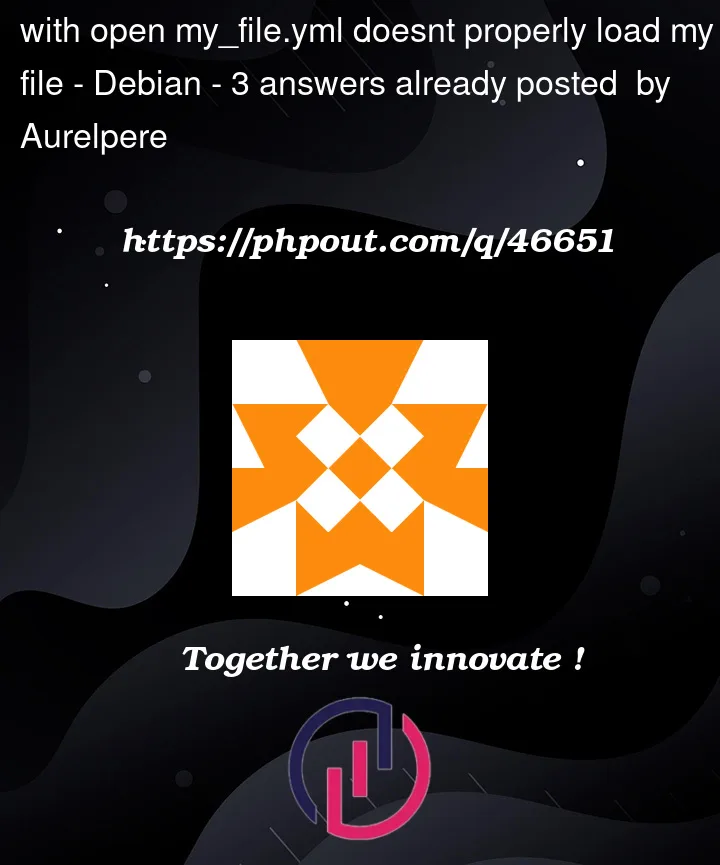Im running a digitalocean droplet and i need to provide a json with the content of a yml in the "user_data" entry like this :
with open("cloud-config.yml", mode="r", encoding="utf-8") as file:
data = {"name": f"{server_name}",
"region":"ams3",
"size":"s-1vcpu-1gb",
"image": "debian-11-x64 ",
"ssh_keys": [list_key()[0],#
list_key()[1]],
"backups": True,
"ipv6": True,
"monitoring": True,
"user_data": """content of yml""",
"with_droplet_agent":True,
}
the content of yml is :
#cloud-config
users:
- name: username
ssh-authorized-keys:
- sshkey
sudo: ['ALL=(ALL) NOPASSWD:ALL']
groups: sudo
shell: /bin/bash
runcmd:
- sed -i -e '/^PermitRootLogin/s/^.*$/PermitRootLogin no/' /etc/ssh/sshd_config
- sed -i -e '$aAllowUsers username' /etc/ssh/sshd_config
- restart ssh
- sudo apt -y update
- sudo apt install -y nano
- sudo apt install -y rsync
- sudo apt install -y ufw
- sudo apt install -y apt-transport-https ca-certificates curl gnupg2 software-properties-common
- sudo curl -fsSL https://download.docker.com/linux/debian/gpg | sudo apt-key add -
- sudo add-apt-repository "deb [arch=amd64] https://download.docker.com/linux/debian $(lsb_release -cs) stable"
- sudo apt -y update
- sudo apt-cache policy docker-ce
- sudo apt install -y docker-ce
- sudo apt install -y docker-compose
- sudo groupadd docker
- sudo usermod -aG docker kr1p
- newgrp docker
- sudo setfacl --modify user:kr1p:rw /var/run/docker.sock
- sudo systemctl start docker
- sudo systemctl enable docker.service
- sudo systemctl enable containerd.service
- sudo fallocate -l 2G /swapfile
- sudo chmod 600 /swapfile
- sudo mkswap /swapfile
- sudo swapon /swapfile
- sudo cp /etc/fstab /etc/fstab.bak
- echo '/swapfile none swap sw 0 0' | sudo tee -a /etc/fstab
- sudo sysctl vm.swappiness=50
- echo 'vm.swappiness=50' | sudo tee -a /etc/sysctl.conf
- sudo sysctl vm.vfs_cache_pressure=50
- echo 'vm.vfs_cache_pressure = 50' | sudo tee -a /etc/sysctl.conf
- sudo mkdir /root/.ssh
- sudo touch '/root/.ssh/authorized_keys'
- sudo systemctl restart sshd
- sudo ufw default deny incoming
- sudo ufw default allow outgoing
- sudo ufw allow ssh
- sudo ufw allow 22
- sudo ufw allow 80
- sudo ufw allow 443
- sudo ufw allow 4000
- sudo ufw allow 4001
- sudo ufw allow 4002
- sudo ufw allow 4003
- sudo ufw allow 4004
- sudo ufw allow 4005
- sudo ufw allow 4006
- sudo ufw allow 4007
- sudo ufw allow 4008
- sudo ufw allow 4009
- sudo ufw allow 4010
- echo 'y' | sudo ufw enable
If i copy paste the content of my yml inside triple quotes in my .py script it works. But if I replace the user_data line with
"user_data": f"{cloudconfig.read()}"
or
"user_data": f"""{cloudconfig.read()}"""
Then it doesnt work.
How come this happens? Is it related to the parsing of n and whitespaces? How can i make it work?




3
Answers
You can use PyYAML to work with
yamlfile in python.First, install it using
pipThen you can load your
yamlfileFrom what I have understood if you need content of YAML and in your data dictionary
Try doing this:
Suppose your
cloud-config.yamlcontains:Then the code prints following JSON (with YAML content as escaped string):
Well, it does work for me if I fix variable name to match: